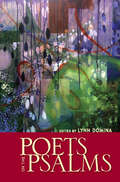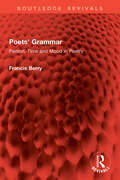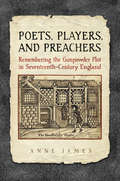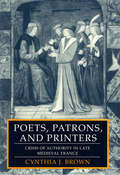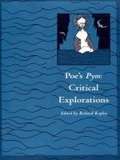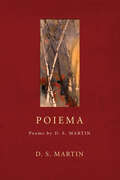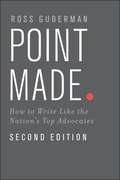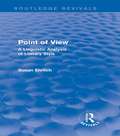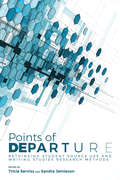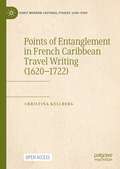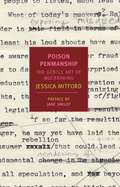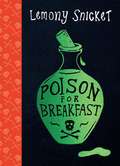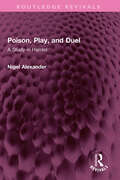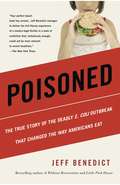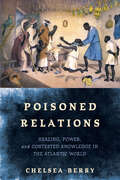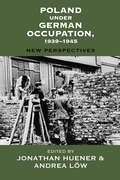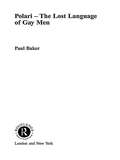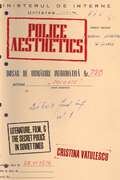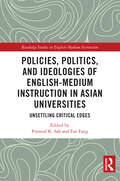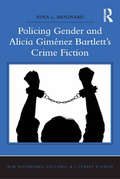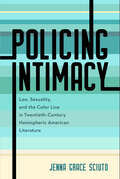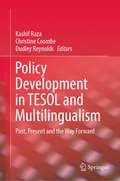- Table View
- List View
Poets on the Psalms
by Lynn DominaReverential, celebratory, antagonistic, and even erotic, this remarkable collection of essays interprets the Psalms as a collection of poetry. Written by 14 acclaimed poets, the essays approach the Psalms from a personal, often autobiographical perspective, demonstrating how relevant they remain for today's readers. Alicia Ostriker examines the Psalms' glory and their terror in a moving essay that revels in their moods of joy while acknowledging the brutality they invoke, linking their violence to events such as 9/11, the Palestinian uprisings, and the Rwandan massacres. Weaving autobiographical anecdotes with scholarly introspection, Enid Dame provides a Jewish explanation of Psalm 22, while editor Lynn Domina contemplates the pastoral life as she connects the everyday with phrases from the Psalms. From a former nun to a self-described left-wing Jew, from a Midrashic scholar to a Texas rancher, the contributors mirror the wide swath of humanity interested in, and affected by, the Psalms.
Poets on the Psalms
by Lynn DominaReverential, celebratory, antagonistic, and even erotic, this remarkable collection of essays interprets the Psalms as a collection of poetry. Written by 14 acclaimed poets, the essays approach the Psalms from a personal, often autobiographical perspective, demonstrating how relevant they remain for today's readers. Alicia Ostriker examines the Psalms' glory and their terror in a moving essay that revels in their moods of joy while acknowledging the brutality they invoke, linking their violence to events such as 9/11, the Palestinian uprisings, and the Rwandan massacres. Weaving autobiographical anecdotes with scholarly introspection, Enid Dame provides a Jewish explanation of Psalm 22, while editor Lynn Domina contemplates the pastoral life as she connects the everyday with phrases from the Psalms. From a former nun to a self-described left-wing Jew, from a Midrashic scholar to a Texas rancher, the contributors mirror the wide swath of humanity interested in, and affected by, the Psalms.
Poets' Grammar: Person, Time and Mood in Poetry (Routledge Revivals)
by Francis Berry dec'dFirst published in 1958, Poets’ Grammar treats of a few grammatical forms and inflexions as they function in the work of some English poets and dramatists. For this purpose, the author is less concerned with the primary meaning of the word Grammar, as given by Shorter Oxford Dictionary, namely “that department of the study of language which deals with its inflexional forms or their equivalents with the rules for employing these correctly”, than with that subordinate meaning of the word, as defined by the same dictionary, namely “an individual's manner of using grammatical forms.”The book discusses important themes like tense in medieval pageant and poem; pronoun and verb in Shakespeare; Elizabethan and Jacobean ‘personal’ insights; Shelley and the future tense; and preposition in poetry and translation. This is an interesting read for scholars and students of English literature and English poetry.
Poets, Players, and Preachers: Remembering the Gunpowder Plot in Seventeenth-Century England
by Anne JamesOn the night of November 4th 1605, the English authorities uncovered an alleged plot by a group of discontented Catholics to blow up the Houses of Parliament with the lords, princes, queen and king in attendance. The failure of the plot is celebrated to this day and is known as Guy Fawkes Day. In Poets, Players and Preachers, Anne James explores the literary responses to the discovery of the Gunpowder Plot in poetry, drama, and sermons. This book is the first full-length study of the literary repercussions of the conspiracy. By analyzing the genres of poems, plays, and sermons produced between 1605 and 1688, the author argues that not only did the continuous reinterpretation of the conspiracy serve religious and political purposes but that such literary reinterpretations produced generic changes.
Poets, Patrons, and Printers: Crisis of Authority in Late Medieval France
by Cynthia J. BrownCynthia J. Brown explains why the advent of print in the late medieval period brought about changes in relationships among poets, patrons, and printers which led to a new conception of authorship.Examining such paratextual elements of manuscripts as title pages, colophons, and illustrations as well as such literary strategies as experimentation with narrative voice, Brown traces authors' attempts to underscore their narrative presence in their works and to displace patrons from their role as sponsors and protectors of the book. Her accounts of the struggles of poets, including Jean Lemaire, Jean Bouchet, Jean Molinet, and Pierre Gringore, over the design, printing, and sale of their books demonstrate how authors secured the status of literary proprietor during the transition from the culture of script and courtly patronage to that of print capitalism.
Poe’s Pym: Critical Explorations
by Richard Kopley"The interpreter's dream-text," as one critic called Edgar Allan Poe's The Narrative of Arthur Gordon Pym has prompted critical approaches almost as varied as the experiences it chronicles. This is the first book to deal exclusively with Pym, Poe's longest fictional work and in many ways his most ambitious. Here leading Poe scholars provide solutions and interpretations for many challenging enigmas in this mysterious novel.The product of a decade of research and planning, Poe's "Pym" offers a factual basis for some of the most fantastic elements in the novel and uncovers surprising connections between Poe's text and exploration literature, nautical lore, Arthurian narrative, nineteenth-century journalism, Moby Dick, and other writings. Representing a rich cross-section of current modes of literary study--from source study to psychoanalytic criticism to new historicism--these sixteen essays probe issues such as literary influence, the limits of language, racism, the holocaust, prolonged mourning, and the structure of the human mind. Poe's "Pym" will be an invaluable resource for students of both contemporary criticism and nineteenth-century American culture. Contributors. John Barth, Susan F. Beegel, J. Lasley Dameron, Grace Farrell, Alexander Hammond, David H. Hirsch, John T. Irwin, J. Gerald Kennedy, David Ketterer, Joan Tyler Mead, Joseph J. Moldenhauer, Carol Peirce, Burton R. Pollin, Alexander G. Rose III, John Carlos Rowe, G. R. Thompson, Bruce I. Weiner
Pohnpeian Alphabet (Island Alphabet Books)
by Lori PhillipsThis book is part of the Island Alphabet Books series, which features languages and children's artwork form the U.S.-affiliated Pacific. Each book contains the complete alphabet for the language, four or five examples for each letter, and a word list with English translations.
Poiema: Poems by D.S. Martin
by D. S. MartinD. S. Martin is a Canadian whose poetry has appeared in numerous literary journals and magazines such as Arc, Canadian Literature, Christianity & Literature, The Christian Century, The Fiddlehead, First Things, and Queen's Quarterly. His chapbook, So the Moon Would Not Be Swallowed, was published with Rubicon Press in 2007.
Point Made: How to Write Like the Nation’s Top Advocates
by Ross Guberman<p>With Point Made, legal writing expert, Ross Guberman, throws a life preserver to attorneys, who are under more pressure than ever to produce compelling prose. What is the strongest opening for a motion or brief? How to draft winning headings? How to tell a persuasive story when the record is dry and dense? The answers are "more science than art," says Guberman, who has analyzed stellar arguments by distinguished attorneys to develop step-by-step instructions for achieving the results you want. <p>The author takes an empirical approach, drawing heavily on the writings of the nation's 50 most influential lawyers, including Barack Obama, John Roberts, Elena Kagan, Ted Olson, and David Boies. Their strategies, demystified and broken down into specific, learnable techniques, become a detailed writing guide full of practical models. In FCC v. Fox, for example, Kathleen Sullivan conjures the potentially dangerous, unintended consequences of finding for the other side (the "Why Should I Care?" technique). Arguing against allowing the FCC to continue fining broadcasters that let the "F-word" slip out, she highlights the chilling effect these fines have on America's radio and TV stations, "discouraging live programming altogether, with attendant loss to valuable and vibrant programming that has long been part of American culture." <p>Each chapter of Point Made focuses on a typically tough challenge, providing a strategic roadmap and practical tips along with annotated examples of how prominent attorneys have resolved that challenge in varied trial and appellate briefs. Short examples and explanations with engaging titles--"Brass Tacks," "Talk to Yourself," "Russian Doll"--deliver weighty materials with a light tone, making the guidelines easy to remember and apply. <p>In addition to all-new examples from the original 50 advocates, this Second Edition introduces eight new superstar lawyers from Solicitor General Don Verrilli, Deanne Maynard, Larry Robbins, and Lisa Blatt to Joshua Rosencranz, Texas Senator Ted Cruz, Judy Clarke, and Sri Srinvasan, now a D.C. Circuit Judge. Ross Guberman also provides provocative new examples from the Affordable Care Act wars, the same-sex marriage fight, and many other recent high-profile cases. Considerably more commentary on the examples is included, along with dozens of style and grammar tips interspersed throughout. Also, for those who seek to improve their advocacy skills and for those who simply need a step-by-step guide to making a good brief better, the book concludes with an all-new set of 50 writing challenges corresponding to the 50 techniques.</p>
Point of View: A Linguistic Analysis of Literary Style (Routledge Revivals)
by Susan L. EhrlichThe purpose of Point of View, first published in 1990, is twofold: from the perspective of linguistics, to analyse the discourse structure of texts; from the perspective of literary studies, to explain certain non-linguistic aspects of the texts in terms of linguistic form. This study therefore aims to provide a balanced and sufficiently comprehensive account of the relationship between linguistic form and point of view. It will be of particular value to literature students with an interest in linguistics, and literary style.
Points of Departure: Rethinking Student Source Use and Writing Studies Research Methods
by Tricia Serviss and Sandra JamiesonPoints of Departure encourages a return to empirical research about writing, presenting a wealth of transparent, reproducible studies of student sources. The volume shows how to develop methods for coding and characterizing student texts, their choice of source material, and the resources used to teach information literacy. In so doing, the volume advances our understanding of how students actually write. The contributors offer methodologies, techniques, and suggestions for research that move beyond decontextualized guides to grapple with the messiness of research-in-process, as well as design, development, and expansion. Serviss and Jamieson’s model of RAD writing studies research is transcontextual and based on hybridized or mixed methods. Among these methods are citation context analysis, research-aloud protocols, textual and genre analysis, surveys, interviews, and focus groups, with an emphasis on process and knowledge as contingent. Chapters report on research projects at different stages and across institution types—from pilot to multi-site, from community college to research university—focusing on the methods and artifacts employed. A rich mosaic of research about research, Points of Departure advances knowledge about student writing and serves as a guide for both new and experienced researchers in writing studies. Contributors: Crystal Benedicks, Katt Blackwell-Starnes, Lee-Ann Kastman Breuch, Kristi Murray Costello, Anne Diekema, Rebecca Moore Howard, Sandra Jamieson, Elizabeth Kleinfeld, Brian N. Larson, Karen J. Lunsford, M. Whitney Olsen, Tricia Serviss, Janice R. Walker
Points of Entanglement in French Caribbean Travel Writing (Early Modern Cultural Studies 1500–1700)
by Christina KullbergThis open-access book investigates Francophone Caribbean literature by exploring and analyzing French seventeenth-century travel writings. The book argues for a literary re-examination of the representation of the early colonial Caribbean by proposing theoretical linkages to contemporary Caribbean theories of creolization and archipelagic thinking. Using Édouard Glissant’s notion of points of entanglement, Christina Kullberg claims that the historical, social, and political messiness of the Caribbean seventeenth century make for complex representations and expressions, generating textual instability despite the travelers’ apparent desires to domesticate the islands. Taking a synoptic approach to travel narratives in French from 1620 up to the publication of Labat’s Nouveau voyage aux Isles de l’Amérique in 1722, Kullberg examines textual instances where the islands and the peoples of this period disrupt and unsettle dominant French narratives and enter productively into the construction of knowledge and the representations of the region. Kullberg’s contribution is to read French early modern travels in situ as shaped by the archipelagic geography, its history and social formations in order to interrogate both the construction and the limitations of discourses of power.
Poison Penmanship
by Jessica MitfordAddresses, essays, and lectures on journalism from the gentle muckraker Jessica Mitford.
Poison Penmanship: The Gentle Art of Muckraking
by Jessica Mitford Jane SmileyJessica Mitford was a member of one of England's most legendary families (among her sisters were the novelist Nancy Mitford and the current Duchess of Devonshire) and one of the great muckraking journalists of modern times. Leaving England for America, she pursued a career as an investigative reporter and unrepentant gadfly, publicizing not only the misdeeds of, most famously, the funeral business (The American Way of Death, a bestseller) and the prison business (Kind and Usual Punishment), but also of writing schools and weight-loss programs. Mitford's diligence, unfailing skepticism, and acid pen made her one of the great chroniclers of the mischief people get up to in the pursuit of profit and the name of good. Poison Penmanship collects seventeen of Mitford's finest pieces--about everything from crummy spas to network-TV censorship--and fills them out with the story of how she got the scoop and, no less fascinating, how the story developed after publication. The book is a delight to read: few journalists have ever been as funny as Mitford, or as gifted at getting around in those dark, cobwebbed corners where modern America fashions its shiny promises. It's also an unequaled and necessary manual of the fine art of investigative reporting.
Poison for Breakfast
by Lemony SnicketA brand-new book from the bestselling author of A Series of Unfortunate Events – a cautionary tale about his own demise. For curious children and adults alike. &‘A strange, beguiling, beautiful book. No one else could have written it, or anything even a little like it. If Lemony Snicket didn&’t exist, we&’d have to invent him.&’ Anthony McGowan, author of Lark &‘Poison for Breakfast is a book to savour... I am a long-time Lemony Snicket fan and this is his best yet.&’ Sarah Hagger-Holt, author of Nothing Ever Happens Here &‘Witty, clever and unsettling – it&’s Lemony Snicket at his finest.&’ Rachel Delahaye, author of Mort the MeekFor more than twenty years, Lemony Snicket has led millions of young readers through a mysterious world of bewildering questions and unfortunate events. With this latest book – a love letter to readers young and old about the vagaries of real life – long-time fans and new readers alike will experience Snicket&’s distinctive voice in a new way. This true story – as true as Lemony Snicket himself – begins with a puzzling note under his door: You had poison for breakfast. Following a winding trail of clues to solve the mystery of his own demise, Snicket takes us on a thought-provoking tour of his predilections...
Poison, Play, and Duel: A Study in Hamlet (Routledge Revivals)
by Nigel AlexanderFirst published in 1971, Poison, Play and Duel explores the dominant symbols of the language and action of Hamlet. The Ghost first reveals that Claudius murdered his brother by poison, and this act of poisoning is then dramatically presented before the King. The ultimate consequence of the ‘poison in jest’ performed by the actors is the poisoned ‘play’ with rapiers between Laertes and Hamlet. This representation of violence, and the vengeful response to violence, creates the moral and the psychological problems of Hamlet. Critics naturally question, and disagree about, the way that Hamlet plays his role in this play because the role of Hamlet is a theatrical device designed to bring all human actions into debate and question. It is hardly surprising that audiences have seen mirrored in Hamlet their own most fundamental and inescapable problems. Nigel Alexander shows how Shakespeare, like Raphael, Titian and other Renaissance artists, developed and adapted the imagery inherited from the Christian and classical past. The battle within the soul, the choice of life, the hunt of passion, the triple face of prudence and the dance of the graces are given dramatic habitation in Hamlet’s soliloquies, in the inner-play and in the savage contrast of sexuality between Gertrude and Ophelia. This book will be of interest to students of literature, drama, psychology and philosophy.
Poisoned
by Jeff Benedict"Your perfect beach book has arrived. With Poisoned, Jeff Benedict manages to deliver the full literary experience of a medico-legal thriller in a work of nonfiction that, fortuitously enough, could not be more relevant to recent headlines."-The New York TimesIn this riveting work of narrative nonfiction, award-winning journalist and best-selling author Jeff Benedict chronicles the events surrounding the biggest food-poisoning epidemic in US history and how this unprecedented crisis sparked public awareness about unsanitary practices in the fast food industry. Poisoned draws on access to confidential documents and exclusive interviews with the real-life characters at the center of the drama.Jeff Benedict is considered one of America's top nonfiction writers. He is the author of nine books including bestsellers Little Pink House, Without Reservation, and Pros and Cons. His reporting has been the basis of feature segments on 60 Minutes, ABC's 20/20, Dateline NBC, HBO's Real Sports with Bryant Gumbel, and the Discovery Channel. He is a contributor to Sports Illustrated and the Deseret News, and his articles have been published in The New York Times, Los Angeles Times, Newsweek, and the Hartford Courant. He has a law degree and is a distinguished professor of English at Southern Virginia University.
Poisoned Relations: Healing, Power, and Contested Knowledge in the Atlantic World (The Early Modern Americas)
by Chelsea BerryIlluminates the competing understandings of poison and power in the Atlantic worldBy the time of the opening of the Atlantic world in the fifteenth century, Europeans and Atlantic Africans had developed significantly different cultural idioms for and understandings of poison. Europeans considered poison a gendered “weapon of the weak” while Africans viewed it as an abuse by the powerful. Though distinct, both idioms centered on fraught power relationships. When translated to the slave societies of the Americas, these understandings sometimes clashed in conflicting interpretations of alleged poisoning events.In Poisoned Relations, Chelsea Berry illuminates the competing understandings of poison and power in the Atlantic World. Poison was connected to central concerns of life: to the well-being in this world for oneself and one’s relatives; to the morality and use of power; and to the fraught relationships that bound people together. The social and relational nature of ideas about poison meant that the power struggles that emerged in poison cases, while unfolding in the extreme context of slavery, were not solely between enslavers and the enslaved—they also involved social conflict within enslaved communities.Poisoned Relations examines more than five hundred investigations and trials in four colonial contexts—British Virginia, French Martinique, Portuguese Bahia, and the Dutch Guianas—bringing a groundbreaking application of historical linguistics to bear on the study of the African diaspora in the Americas. Illuminating competing understandings of poison and power in this way, Berry opens new avenues of evidence through which to navigate the violence of colonial archival silences.
Poland under German Occupation, 1939-1945: New Perspectives (Vermont Studies on Nazi Germany and the Holocaust #9)
by Jonathan Huener and Andrea LöwAs a unique and innovative addition to the scholarship on Nazi Germany, the Holocaust, and modern Polish history, this volume provides fresh analysis on the Nazi occupation of Poland. Through new questions and engaging untapped sources the leading historians who have contributed to this volume provide original scholarship to steer debates and expand the historiography surrounding Nazi racial and occupation policies, Polish and Jewish responses to them, persecution, police terror, resistance, and complicity.
Polari - The Lost Language of Gay Men (Routledge Studies in Linguistics #Vol. 1)
by Paul BakerPolari is a secret form of language mainly used by homosexual men in London and other cities during the twentieth century. Derived in part from the slang lexicons of numerous stigmatised and itinerant groups, Polari was also a means of socialising, acting out camp performances and reconstructing a shared gay identity and worldview among its speakers. This book examines the ways in which Polari was used in order to construct 'gay identities', linking its evolution to the changing status of gay men and lesbians in the UK over the past fifty years.
Police Aesthetics: Literature, Film, and the Secret Police in Soviet Times
by Cristina VatulescuThis volume, at once a history of Soviet cinema and a primer on the historiographical analysis of secret police files, provides an interesting multi-disciplinary discussion of the police in film, police as film makers and the criminal as subject in the darkest corners of the Soviet police state. Arguing that the levels of implicit and explicit control exercised by secret police authorities in Stalin-era Russia created a cultural framework in which art, literature and film, even those not directly affected by the regime, bore the unmistakable mark of their influence. Vatulescu is a professor of comparative literature at New York University. Annotation ©2011 Book News, Inc., Portland, OR (booknews.com)
Policies, Politics, and Ideologies of English-Medium Instruction in Asian Universities: Unsettling Critical Edges (Routledge Studies in English-Medium Instruction)
by Pramod K. Sah and Fan FangAgainst the backdrop of uncritical promotions of English-Medium instruction (EMI) in higher education globally, this edited volume maps out the political, ideological, and policy-related issues of EMI programs in multilingual and multicultural universities in Asia. In this volume, EMI researchers and practitioners involved in different Asian countries and regions have collaboratively unpacked the critical dimensions of EMI programs in higher education, with a goal to provide must-needed resources for researchers, graduate students, higher education leaders, and policymakers. This volume is the first of its kind in that it provides an exclusive and critical tapestry of EMI at multilingual universities from all parts of Asia, including Central Asia (Kazakhstan), East Asia (Mainland China, Korea, Japan, and Taiwan), South Asia (Bangladesh and Nepal), Southeast Asia (Brunei, Malaysia, Philippines, Thailand, and Vietnam), and Western Asia (United Arab Emirates). The key takeaway for the reader is to not only understand the current phenomenon of EMI in Asian universities but to also learn the dark side of its policies, programs, and practices that have led to unequal teaching and learning spaces in diverse societies. This collection will be of interest to scholars and policymakers in English-medium instruction, English language teaching, TESOL, and applied linguistics.
Policing Gender and Alicia Giménez Bartlett's Crime Fiction (New Hispanisms: Cultural and Literary Studies)
by Nina L. MolinaroAlicia Giménez Bartlett’s popular crime series, written in Spanish and organized around the exploits of Police Inspector Petra Delicado and Deputy Inspector Fermin Garzon, is arguably the most successful detective series published in Spain during the previous three decades. Nina L. Molinaro examines the tensions between the rhetoric of gender differences espoused by the woman detective and the orthodox ideology of the police procedural. She argues that even as the series incorporates gender differences into the crime series formula, it does so in order to correct women, naturalize men’s authority, sanction social hierarchies, and assuage collective anxieties. As Molinaro shows, with the exception of the protagonist, the women characters require constant surveillance and modification, often as a result of men’s supposedly intrinsic protectiveness or excessive sexuality. Men, by contrast, circulate more freely in the fictional world and are intrinsic to the political, psychological, and economic prosperity of their communities. Molinaro situates her discussion in Petra Delicado’s contemporary Spain of dog owners, ¡Hola!, Russian cults, and gated communities.
Policing Intimacy: Law, Sexuality, and the Color Line in Twentieth-Century Hemispheric American Literature
by Jenna Grace SciutoIn Policing Intimacy: Law, Sexuality, and the Color Line in Twentieth-Century Hemispheric American Literature, author Jenna Grace Sciuto analyzes literary depictions of sexual policing of the color line across multiple spaces with diverse colonial histories: Mississippi through William Faulkner’s work, Louisiana through Ernest Gaines’s novels, Haiti through the work of Marie Chauvet and Edwidge Danticat, and the Dominican Republic through writing by Julia Alvarez, Junot Díaz, and Nelly Rosario. This literature exposes the continuing coloniality that links depictions of US democracy with Caribbean dictatorships in the twentieth century, revealing a set of interrelated features characterizing the transformation of colonial forms of racial and sexual control into neocolonial reconfigurations. A result of systemic inequality and large-scale historical events, the patterns explored herein reveal the ways in which private relations can reflect national occurrences and the intimate can be brought under public scrutiny. Acknowledging the widespread effects of racial and sexual policing that persist in current legal, economic, and political infrastructures across the circum-Caribbean can in turn bring to light permutations of resistance to the violent discriminations of the status quo. By drawing on colonial documents, such as early law systems like the 1685 French Code Noir instated in Haiti, the 1724 Code Noir in Louisiana, and the 1865 Black Code in Mississippi, in tandem with examples from twentieth-century literature, Policing Intimacy humanizes the effects of legal histories and leaves space for local particularities. By focusing on literary texts and variances in form and aesthetics, Sciuto demonstrates the necessity of incorporating multiple stories, histories, and traumas into accounts of the past.
Policy Development in TESOL and Multilingualism: Past, Present and the Way Forward
by Christine Coombe Kashif Raza Dudley ReynoldsThe book is of interest to scholars of multilingualism, language teachers, researchers, and administrators who are developing policies on teaching English and promoting multilingualism. Given its scope, this edited collection provides an overview of how multilingualism is transforming the practice of Teaching English to Speakers of Other Languages (TESOL) in diverse contexts around the world. It serves as a platform for discussions related to policy enactment where TESOL and multilingualism are viewed as collaborative endeavours and approaches the topic from three different angles. The first section of the book provides critical examinations of previous initiatives and accomplishments in the area of language policy development and implementation. The second section describes current projects and initiatives intended to expand and strengthen the field of TESOL while providing space for local and indigenous languages to develop. The third and last part of the book highlights policy development areas that need special consideration in order to develop a form of TESOL that builds on and contributes to multilingualism.
